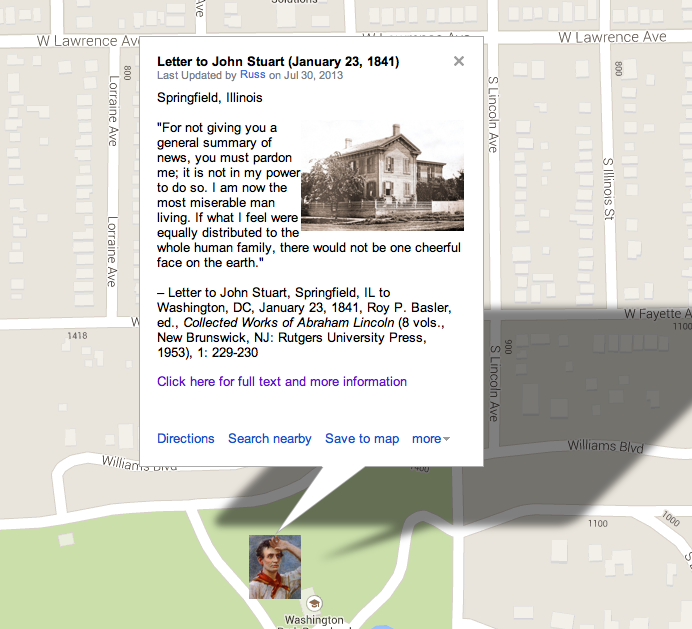Ranking
#101 on the list of 150 Most Teachable Lincoln Documents
Annotated Transcript
On This Date
HD Daily Report, January 23, 1841
The Lincoln Log, January 23, 1841
Custom Map
How Historians Interpret
“In fact, Lincoln went ‘crazy for a week or so’ and was nursed back to health at the Butlers’ home, where his friend Orville H. Browning was staying. Browning said his friend ‘was so much affected as to talk incoherently, and to be delirious to the extent of not knowing what he was doing.’ This ‘aberration of mind resulted entirely from the situation he . . . got himself into – he was engaged to Miss Todd, and in love with Miss Edwards, and his conscience troubled him dreadfully for the supposed injustice he had done, and the supposed violation of his word which he had committed.’ Many friends, including James H. Matheny, ‘thought L[incoln] would commit suicide.’ They ‘had to remove razors from his room – take away all Knives and other such dangerous things – &c – it was terrible.’ Joshua Speed wrote that ‘a gloom came over him till his friends were alarmed for his life.’ According to Speed, Lincoln wrote a poem about suicide and declared that he ‘would be more than willing’ to die, but, he said, ‘I have an irrepressible desire to live till I can be assured that the world is a little better for my having lived in it.'”
“Though he had earlier longed to end his commitment to Mary Todd, he now began to suspect. . .that he loved her more than he had thought. Even more important, he was haunted by ‘the never-absent idea’ that he had made Mary unhappy. . . Losing both his only intimate friend and his fiancée within a matter of days was more than Lincoln could bear, and he collapsed. Taking to his bed for about a week, he was unwilling to see anyone except his doctor and Speed, who had not yet left for Kentucky. Years later, Speed said he thought Lincoln might commit suicide. . . Just what specific advice Speed offered his friend is unknown, but my guess is that he told Lincoln that he should either end his relationship with Mary Todd or marry her. Lincoln acknowledged the correctness of the advice but could not act on it. Unable to make a choice, he was, as he wrote his law partner, John T. Stuart, ‘the most miserable man living. . .’ More than a year later, he still could not decide. ‘Before I resolve to do the one thing or the other,’ he confessed to Speed, ‘I must regain my confidence in my own ability to keep my resolves when they are made.'”
–David Herbert Donald, Lincoln (New York: Simon & Schuster, 1995), 44-45
NOTE TO READERS
This page is under construction and will be developed further by students in the new “Understanding Lincoln” online course sponsored by the House Divided Project at Dickinson College and the Gilder Lehrman Institute of American History. To find out more about the course and to see some of our videotaped class sessions, including virtual field trips to Ford’s Theatre and Gettysburg, please visit our Livestream page at http://new.livestream.com/gilderlehrman/lincoln

